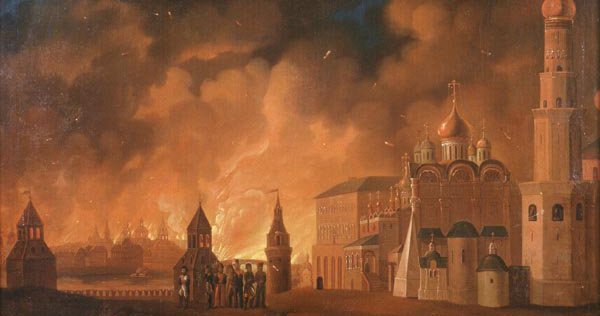
*
Who started the fire in Moscow? Each side was blaming the other. The French thought that it was the result of the Russians’ fierce patriotism: They just wanted to spoil Napoleon’s triumph. The Russians, on the other hand, claimed that the fire was an unavoidable result of the savagery of the French: they looted its riches and then burned the city down out of envy.
For Leo Tolstoy who writes about the events in War and Peace, the blame lies on neither side. It might be “flattering” he writes, for the French to blame the brutal Russians, and for the Russians to blame “the villain Bonaparte”, but “it is impossible not to see that there could be no such immediate causes for the burning”. The evidence is clear: a wooden town, Moscow, was abandoned by its proper inhabitants and was now full of indifferent and careless strangers who were “allowed to take over and start cooking kasha for themselves”.
It’s impossible not to see, writes Tolstoy.
Perhaps it is also impossible not to see the exaggerated optimism involved in thinking of the pursuit of truth as a process of hypothesis forming, testing and refuting. Tolstoy’s view of the fire of Moscow might well be correct. But when you are, say, an inhabitant of Moscow at the time and you see, in fear and despair, the fire devastating your city and French soldiers looting your possessions, forming and testing hypotheses is low in your priorities. Tolstoy’s syllogism will not do the trick for you.
*
None can claim to have full awareness and full command of all the processes they participate in. It’s just not possible. Consider, for example, Engels. “History”, he writes a few years after Tolstoy, “is made in such a way that the final result always arises from conflicts between many individual wills […] What each individual wills is obstructed by everyone else, and what emerges is something that no one willed.”
With all their respective differences, Tolstoy and Engels share a Hegelian understanding of history. Hegel claimed that there is a logic in history, a logic that is not discernible on the level of individual action. History has a direction: it comes from somewhere and goes towards somewhere. Engels (and Marx with him) would agree. Their starting points differed, of course, and so did their conclusions. But both thought of history as having a direction, knowable in principle.
Tolstoy on the other hand would be more constrained. Even though there is a logic of history, this logic can only be retroactively interpreted. Historical processes are far too chaotic, the origin of this chaos being individual action and freedom as such.
People cannot avoid trying to understand the logic of events. Things can only happen for a reason. When you know the reason, things feel a bit safer. You hope you can prepare yourself. That’s a vain hope, and a false sense of safety. But when you are in the midst of things, the most important thing is to find something that can keep a check on your fear and despair. You need a reassuring explanation. Not truth.
PrintChristos Tombras | Radio Free (2020-06-25T11:39:50+00:00) The Fire of Moscow. Retrieved from https://www.radiofree.org/2020/06/25/the-fire-of-moscow/
Please log in to upload a file.
There are no updates yet.
Click the Upload button above to add an update.